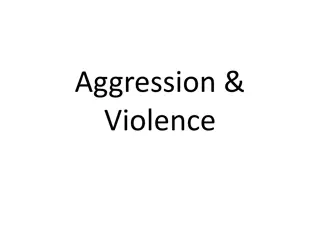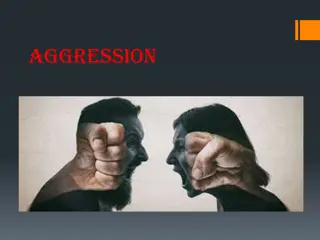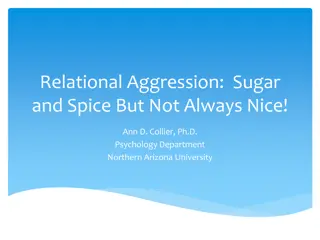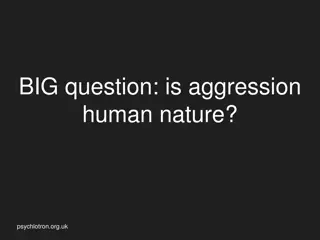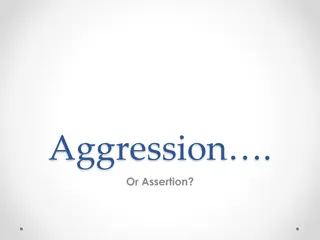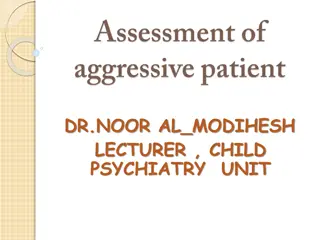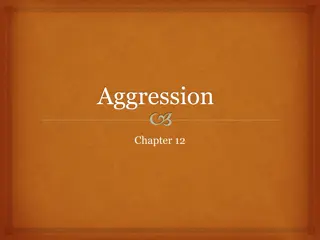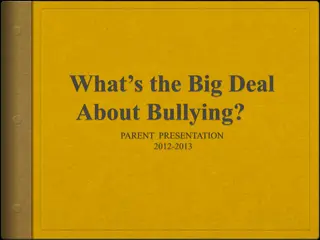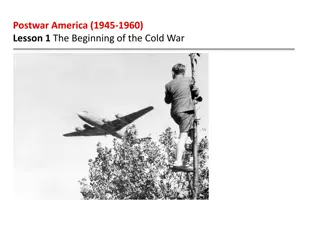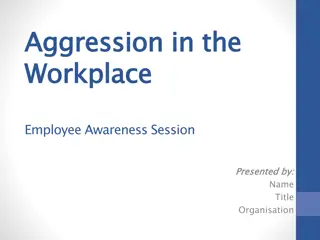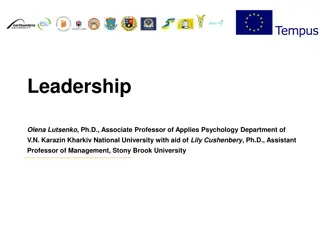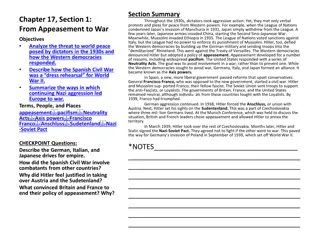Workplace Health and Safety Update - March 2024
The March 2024 update focuses on critical risk statistics, the safety topic of the month which is Aggression and Violence, and highlights the impact of these behaviors on individual and workplace health. It emphasizes the importance of recognizing signs of aggression and violence, de-escalation tech
3 views • 10 slides
Theories Explaining Deviant Sexual Behavior Throughout History
Explore historical theories on deviant sexual behavior, including demonological, anomie, psychoanalytical, human ecology, and somatotyping theories. These theories range from supernatural beliefs of possession to scientific interpretations of societal influences and individual characteristics.
2 views • 33 slides
Understanding Aggression and Violence: Theories and Influences
Exploring the concept of aggression, this content delves into various theories surrounding aggressive behavior, such as the Biological, Frustration, and Learned Social Behavior perspectives. It also touches on influences on aggression like aversive incidents, arousal, and media influence, while prop
1 views • 45 slides
Psychological Theories of Criminality: Understanding the Roots
Psychological theories of criminality delve into the association between intelligence, personality, learning, and criminal behavior. Major theories include Psychodynamic Theory by Freud, Behavioral Theory by Bandura, and Cognitive Theory by Kohlberg. These theories explore how unconscious mental pro
1 views • 20 slides
National Monument Against Violence and Aggression: The Knife Angel in Blackburn Cathedral
Explore the reasons why people carry knives, the Lancashire statistics on knife crime, the strict laws regarding knife possession, and illegal blades to raise awareness and promote a safer community. The Knife Angel exhibit at Blackburn Cathedral emphasizes the impact of violence and aggression. It
0 views • 14 slides
Exploring Leadership Theories: Traits and Behaviors
Leadership theories have evolved from trait theory focusing on personal qualities to behavioral theories emphasizing actions and interactions. While early research sought universal traits for leadership, it encountered challenges due to varied traits among leaders and non-leaders. Behavioral theorie
2 views • 29 slides
Understanding Aggression: Causes and Solutions
Aggression is any intentional behavior aimed at harming others, whether physically, verbally, or emotionally. It can be instrumental or hostile. Biological factors like hormones and neural substrates, social/cultural factors such as frustration and provocation, and environmental/situational factors
0 views • 10 slides
Unraveling COVID-19 Conspiracy Theories and Hoaxes
Exploring various conspiracy theories surrounding the origins of COVID-19, from bat soup to bioweapons and espionage. Dive into wilder theories involving population control, world war, and even Disney's supposed predictions. Understand the differences between conspiracy theories and hoaxes, shedding
2 views • 11 slides
Indo-Pacific Crisis: Managing Chinese Aggression in 2028
In January 2028, a maritime standoff between China and the Philippines escalates, leading to cyber-attacks, social unrest, and military clashes. By February, the Indo-Pacific Command activates JTF 77 to counter Chinese aggression in the region, focusing on limited military objectives. Amidst escalat
1 views • 10 slides
Understanding Sociological Theories and Frameworks
Sociological theories, encompassing micro and macro perspectives, provide a lens to interpret societal dynamics. Consensus theories like functionalism emphasize shared norms, while conflict theories such as Marxism highlight social inequalities. Social action theories like interactionism focus on in
3 views • 21 slides
Online Seminar: Theories of Learning in Initial Teacher Education
This collection of online seminar slides introduces pre-service teachers to major theories of learning, including the Science of Learning through cognitive neuroscience. The presentation aims to help educators consider implications for teaching, recognize theories in action, and pose critical questi
1 views • 11 slides
Theories of Causation in Psychological and Social Sciences
Overview of theories of causation categorized into psychological, social psychological, and sociological perspectives. Psychological theories focus on instinctive, biological, and psychological qualities of abusers, including Attachment Theory, Psychodynamic Theory, Social Learning Theory, and Situa
0 views • 15 slides
Introduction to Quantum Chromodynamics & Field Theories in High-Energy Physics
Explore the fundamentals of Quantum Chromodynamics and Classical Field Theories in this informative lecture, covering topics such as global and local symmetries, Lagrangians, actions, and dynamics. Understand the significance of global and local symmetries in classical field theories, along with exa
2 views • 17 slides
Comprehensive Overview of Student Affairs Theories
This collection explores key theories in student affairs, including cognitive-structural theories, learning theories, and person-environment theories. Cognitive-structural theories delve into how individuals process information, while learning theories examine how people absorb knowledge. Person-env
3 views • 19 slides
Understanding Theories and Concepts in Research
The content delves into the fundamental concepts of theories and variables in research. It discusses the nature of theories, including descriptive, explanatory, and predictive theories. Additionally, it examines the role of concepts in providing identity and meaning to objects and phenomena. Through
2 views • 55 slides
Classical Trade Theories and Their Limitations in International Economics
Classical trade theories such as the Theory of Absolute Advantage by Adam Smith and the Theory of Comparative Advantage by David Ricardo highlight the benefits of free trade and specialization based on natural advantages. However, these theories have limitations, such as the inability to explain sce
0 views • 8 slides
Applying Theories and Models in Integrated Health: Module 3 Overview
This module delves into the application of various theories, perspectives, and practice models in integrated healthcare. Students will learn to utilize different theories to enhance their understanding and practice in integrated health, focusing on aspects like personal impact, behavioral change the
0 views • 78 slides
Accelerating Lemma Learning Using Joins in Satisfiability Modulo Theories
Explore the use of joins in accelerating lemma learning within the context of Satisfiability Modulo Theories (SMT). The study covers various SMT applications at Microsoft and delves into the development of the Z3 solver. Key topics include theories, arithmetic operations, array theory, uninterpreted
0 views • 25 slides
Understanding Aggression: The Intersection of Theories and Applications in Violence Reduction
Exploring the multifaceted nature of aggression, this content delves into theories of violence, effects of trauma, current treatment approaches, and the future of using Eye Movement Desensitization and Reprocessing (EMDR) in reducing aggression. From defining aggression to examining early theories,
0 views • 64 slides
Tracing Verbal Aggression and Facework Strategies Over Time
Dawn Archer and Bethan Malory explore the tracing of verbal aggression and other facework strategies over time using themes from the Historical Thesaurus of English. They utilize automated content analysis tools to analyze datasets from various historical periods and propose solutions for prioritizi
0 views • 41 slides
Understanding Relational Aggression in Girls: The Impact on Social Relationships
Relational aggression, a form of social bullying, can have detrimental effects on girls' social relationships and self-esteem. This type of indirect aggression includes behaviors like exclusion, spreading rumors, and social manipulation. Understanding and assessing relational aggression is crucial f
0 views • 22 slides
Understanding Aggression: Exploring Its Evolutionary Roots
Delve into the complexities of human aggression, questioning whether it is inherent or a learned behavior. Explore evolutionary theories and biological perspectives on the causes of aggression, examining how factors such as genetics, brain structures, hormones, and environmental pressures may influe
0 views • 11 slides
Understanding the Dynamics of Aggression and Assertion in Competitive Environments
Aggression is intentional behavior aimed at harming others, while assertion is forceful yet non-harmful conduct within the spirit of competition. Factors like antecedents, perceived unfairness, and pressure to win can trigger aggression in sports. Recognizing the differences between hostile and chan
0 views • 10 slides
Addressing Challenges in Community Rights and Development Aggression
The problem highlighted is the improper lensing of rights in communities, leading to aggression and knowledge gaps. Communities often do not engage due to cultural differences, political pressure, or corrupt practices. There is a lack of transparency and information availability in development proje
0 views • 6 slides
Understanding Cat Aggression and How to Deal with It
Cat aggression towards humans can stem from various reasons such as fear, handling issues, play-related behaviors, pregnancy, pain, or redirected aggression. This behavior can vary among different cat breeds. Recognizing the triggers and responding appropriately is essential to manage and prevent ca
1 views • 9 slides
Understanding the Nature vs. Nurture Debate in Aggressive Behavior
Aggression is a prevalent issue in society, with factors like biology (testosterone levels, genetics) and environment (parental influence, exposure to violence) playing crucial roles. The debate on whether aggression stems from nature or nurture is explored through various perspectives, such as etho
0 views • 35 slides
Understanding Agitation and Aggression in Psychiatric Patients
Agitation is a tension state characterized by anxiety and hyperactivity seen in depression, schizophrenia, and mania, while aggression involves hostile thoughts or actions towards others, common in impulse control disorders. Psychiatric patients are usually not aggressive, but certain mental illness
0 views • 16 slides
Understanding the Difference Between Aggression and Agitation in Psychiatry
Aggression involves verbal or physical attacks, while agitation is a state of mental disturbance leading to physical restlessness and increased arousal. Both can be common presentations in psychiatric emergencies with various risk factors and management strategies involved, including verbal communic
0 views • 14 slides
Insights into Aggression: Causes, Gender Differences, and Influencing Factors
Aggression is intentional behavior aimed at causing harm, with instrumental and hostile forms. Gender differences show males are more physically aggressive, while females engage in relational aggression. Aggression is influenced by situational and cultural factors, with influences from alcohol. Unde
0 views • 31 slides
Theories and Concepts in Semantics: Classical vs. Prototype Approaches
Explore different theories of concepts in semantics, including classical theories based on necessary and sufficient conditions, causal theories, and prototype theories. Compare their strengths and limitations in handling fuzziness, asymmetry, and internal structure of concepts. Discover how experime
1 views • 46 slides
Integrating Theories and Models for Enhanced Health Practice
Explore the application of theories, perspectives, and practice models in integrated health through Module 3. Learn how theories guide assessment, treatment, and patient outcomes. Discover common theories enhancing assessment and supporting individuals through grief and loss. Gain insights into the
0 views • 78 slides
Comprehensive Overview of Leadership Theories and Styles
Leadership encompasses the ability to influence a group towards achieving goals by knowing oneself, communicating vision, building trust, and taking effective action. Various leadership styles include Autocratic, Democratic, Free-Rein, and Paternalistic, each with distinct decision-making approaches
0 views • 19 slides
Understanding Bullying: Types, Impact, and Prevention
Bullying is a serious issue affecting many individuals, especially in school settings. It can lead to devastating consequences such as drops in grades, convictions, and even suicides. The different types of bullying include physical aggression, social alienation, verbal aggression, intimidation, cyb
0 views • 11 slides
Managing Combative Residents in Long-Term Care
Residents in long-term care facilities may exhibit combative behaviors due to underlying psychiatric conditions, cognitive impairment, or dementia. This aggression poses challenges for both staff and other residents. Caregiver training is crucial for identifying triggers and managing combative episo
0 views • 17 slides
The Beginning of the Cold War: Postwar America (1945-1960) Lesson 1
Postwar America (1945-1960) Lesson 1 explores the unraveling of the wartime alliance between the United States and the Soviet Union, President Truman's response to Soviet aggression in Eastern Europe, and the causes and results of Stalin's blockade of Berlin. The background of the Cold War, Soviet a
0 views • 22 slides
How Sports Help with Aggression: Let's Share Our Games 2019
Understanding aggression and its different types is crucial in addressing harmful behaviors. Engaging in sports activities, such as basketball, soccer, and martial arts, has been shown to reduce aggression by promoting self-control skills and channeling negative emotions into physical activity. Team
0 views • 9 slides
Collective Security in International Relations: A Comprehensive Overview
Collective security is a crucial concept in international politics, aimed at maintaining peace and preventing aggression among nations. This system calls for joint action to counter threats to global peace, originating post-World War I with the League of Nations. Based on four key principles, nation
0 views • 8 slides
Workplace Aggression Awareness Session: Understanding and Prevention
This employee awareness session sheds light on workplace aggression, its definition, effects, sources, and management. It outlines employer and employee responsibilities, current control measures, and provides training objectives to enhance awareness and prevent harm. Additionally, it emphasizes the
0 views • 32 slides
Understanding Leadership Theories and Styles
Leadership involves influencing a group towards a common goal. Traits, interaction styles, and group dynamics play vital roles in effective leadership. Various theories, such as Trait Theories and Synthetic Leadership Theories, provide insights into different aspects of leadership. Understanding lea
0 views • 41 slides
Dictator Aggression and the Outbreak of World War II in the 1930s
Throughout the 1930s, dictators such as Hitler, Mussolini, and Japanese leaders took aggressive actions that threatened world peace. Western democracies responded with verbal protests and a policy of appeasement, allowing dictators to expand their empires unchecked. The Spanish Civil War served as a
0 views • 4 slides


